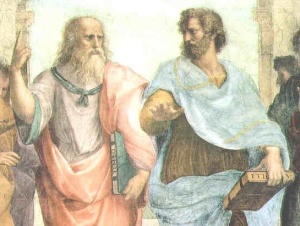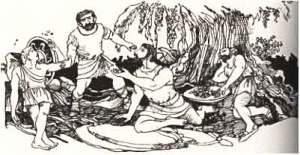In the opening chapters of My Lady Olives, Olisbeth Mason is reading a book titled “Plato’s Meno” when she is rudely interrupted.
The following post contains a few selections from Meno, Specifically the discussion on the idea of anamnesis . The text in its entirety can be found here.
Meno: And how will you enquire, Socrates, into that which you do notknow? What will you put forth as the subject of enquiry? And if you find what you want, how will you ever know that this is the thing which you did not know?
Socrates. I know, Meno, what you mean; but just see what a tiresome dispute you are introducing. You argue that man cannot enquire either about that which he knows, or about that which he does not know; for if he knows, he has no need to enquire; and if not, he cannot; for he does not know the, very subject about which he is to enquire.
Meno: Well, Socrates, and is not the argument sound?
Socrates. I think not.
<<<< Socrates talks about Reincarnation as a given>>
“For in the ninth year Persephone sends the souls of those from whom she has received the penalty of ancient crime back again from beneath into the light of the sun above, and these are they who become noble kings and mighty men and great in wisdom and are called saintly heroes in after ages.”
The soul, then, as being immortal, and having been born again many times….
Meno. Yes, Socrates; but what do you mean by saying that we do not learn, and that what we call learning is only a process of recollection?
Can you teach me how this is?
Socrates: … I am saying that there is no teaching, but only recollection…
Meno: … if you can prove to me that whatyou say is true, I wish that you would.
Socrates. It will be no easy matter, but I will try to please you to the utmost of my power. Suppose that you call one of your numerous attendants,that I may demonstrate on him.
<<Meno Calls a slave boy forward>>>
Socrates. He is Greek, and speaks Greek, does he not?
Meno. Yes, indeed; he was born in the house.
Socrates: Attend now to the questions which I ask him, and observe whether he learns of me or only remembers.
Meno: I will.
Socrates: Tell me, boy, do you know that a figure like this is a square?
Boy. I do.
Socrates: And you know that a square figure has these four lines equal?
Boy. Certainly.
Socrates: And these lines which I have drawn through the middle of the square are also equal?
Boy. Yes.
Socrates: A square may be of any size?
Boy. Certainly.
<<Socrates continues asking the boy about squares, and the boy answers questions properly.>>
Socrates: Do you observe, Meno, that I am not teaching the boy anything, but only asking him questions; and now he fancies that he knows how long a line is necessary in order to produce a figure of eight square feet; does he not?
Meno: Yes.
Socrates: And does he really know?
Meno: Certainly not.
Socrates: He only guesses that because the square is double, the line is double.
Meno: True.
Socrates: <<to the boy>> I want to know whether you still say that a double
square comes from double line?
Boy. Yes.
<<Socrates continues to ask the boy questions, the boy answers> >
Socrates: What do you say of him, Meno? Were not all these answers given out of his own head?
Meno: Yes, they were all his own.
Socrates: And yet, as we were just now saying, he did not know?
Meno: True.
Socrates: But still he had in him those notions of his-had he not?
Meno: Yes.
Socrates: Then he who does not know may still have true notions of that which he does not know?
Meno: He has.
Socrates: And at present these notions have just been stirred up in him, as in a dream; but if he were frequently asked the same questions, in different forms, he would know as well as any one at last?
Meno: I dare say.
Socrates: Without any one teaching him he will recover his knowledge for himself, if he is only asked questions?
Meno: Yes.
Socrates: And this spontaneous recovery of knowledge in him is recollection?
Meno: True.
Socrates: And this knowledge which he now has must he not either have acquired or always possessed?
Meno: Yes.
Socrates: But if he always possessed this knowledge he would always have known; or if he has acquired the knowledge he could not have acquired it in this life, unless he has been taught geometry; for he may be made to do the same with all geometry and every other branch of knowledge. Now, has any one ever taught him all this? You must know about him, if, as you say, he was born and bred in your house.
Meno: And I am certain that no one ever did teach him.
Socrates: And yet he has the knowledge?
Meno: The fact, Socrates, is undeniable.
Socrates: But if he did not acquire the knowledge in this life, then he must have had and learned it at some other time?
Meno: Clearly he must.
…





